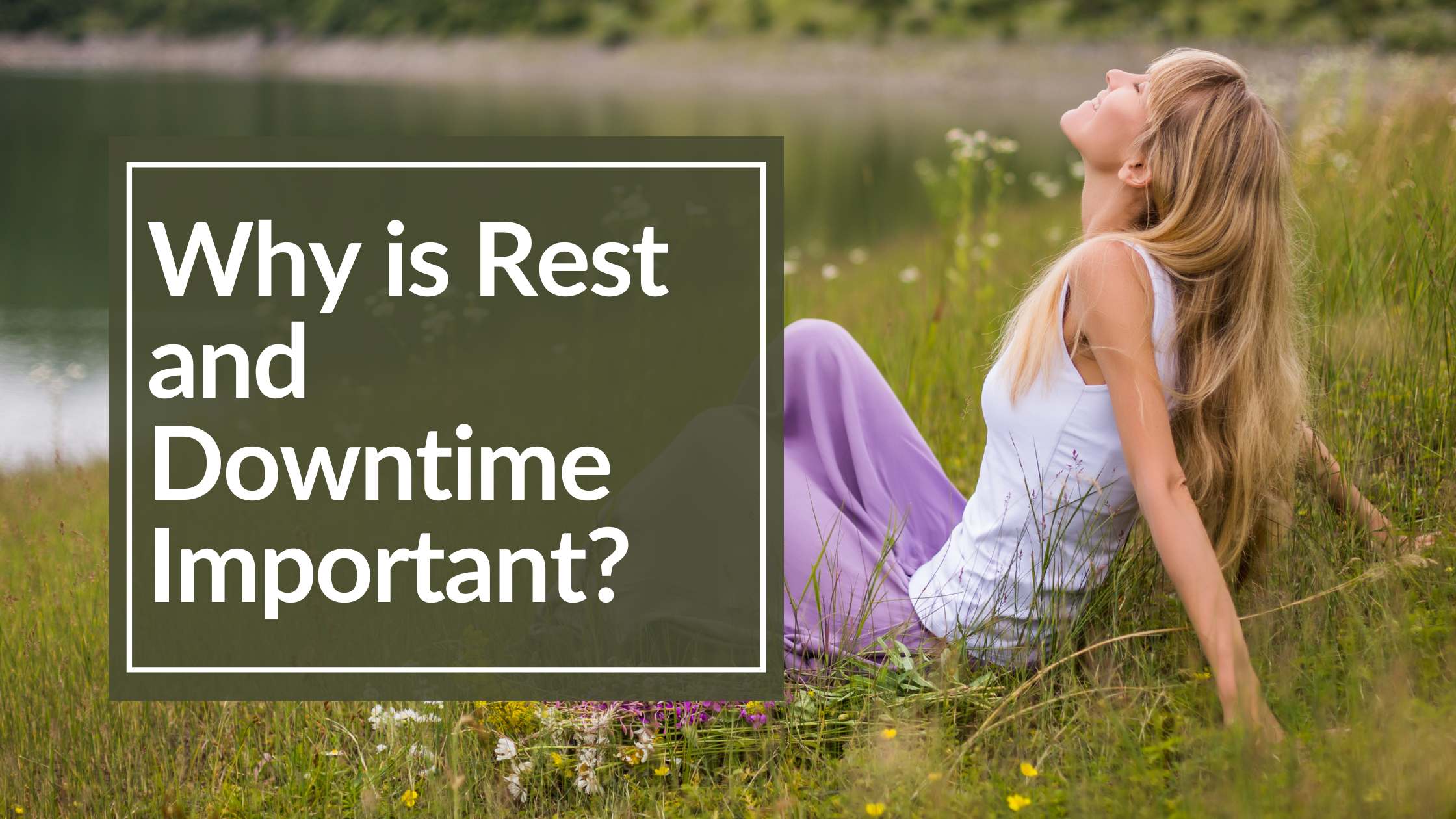
Rest and downtime. Do you prioritize this?
It plays a vital role in your wellbeing.
Rest and downtime are often overlooked in our fast-paced, productivity-driven society. We are constantly bombarded with messages that encourage us to work harder, longer, and push ourselves to the limit. But what if we told you that rest and downtime are not just luxuries, but essential components of our overall well-being? In this post, we will explore the importance of rest and downtime, the negative effects of a lack thereof, and the scientific evidence behind why we need to prioritize them in our lives.
The Importance of Rest and Downtime for Our Well-being
Rest and downtime are crucial for our physical, mental, and emotional well-being. When we take time to rest, our bodies and minds have a chance to recharge and rejuvenate. This allows us to recover from the stresses and strains of daily life, preventing burnout and promoting overall health.
Taking a time out, is an important step in holistic health. Physically, the rest allows our muscles to repair and grow stronger. It helps to regulate our hormones and immune system, reducing the risk of illness and disease. Rest has a positive affect on our Nervous System, and circadian rhythm.
Mentally, rest allows our brains to process information and consolidate memories, improving cognitive function and enhancing learning and creativity. Our mood can be much improved with rest. Have you ever noticed that your outlook on life is much better when on vacation?
Our emotional state does much better with rest, as it gives us the opportunity to relax and unwind, reducing stress and promoting a sense of calm and well-being. We also are in a better place to cultivate emotional intelligence and emotional regulation.
The Negative Effects of a Lack of Rest and Downtime
On the flip side, a lack of rest and downtime can have serious consequences for our health and well-being. Have you ever experienced burn out? When we don’t give ourselves a chance to rest, both mentally and physically, we can find ourselves with so little energy and mental clarity, we may face burn out. When you find little time for joy, or even the desire to do every day activities, stop and do a check in. Burn out, as WebMD explains, is “when you’re overwhelmed, emotionally drained, and unable to keep up with life’s incessant demands.”
This can even lead to depression.
Lack of rest and downtime means we become more susceptible to physical and mental health issues. Lack of sleep, for example, has been linked to an increased risk of blood sugar imbalances and cardiovascular issues. This impedes on the quest to creating balanced health.
Why is that? We consider lack of sleep a stress to the body. It affects many different systems including the Lymph System, and the Nervous System. These two are linked through the Glymphatic System, which ONLY works when you are sleeping.
Mentally, a lack of downtime can lead to increased levels of stress, anxiety, and depression. It impairs our ability to think clearly, make decisions, and solve problems. It can also negatively impact our relationships, as we become more irritable and less able to communicate effectively with others.

The Science Behind Rest and Downtime
So, why is rest and downtime so important for our well-being? The answer lies in the science of our bodies and minds. When we rest, our bodies enter a state of relaxation known as the parasympathetic state. During this state, our heart rate and blood pressure decrease, our breathing slows down, and our muscles relax. This allows our bodies to recover and repair, reducing inflammation and promoting healing.
This is also crucial to your Digestive System and your ability to assimilate nutrients. When you are stressed and in a sympathetic state, within your Nervous System, your digestion suffers. This state is also known as the fight, flight, freeze or fawn state. One of our practitioners, Amanda Panacea LMHC and MSC in Human Nutrition and Functional Medicine, helps clients move from this state to a parasympathetic state on a regular basis.
In addition, rest and downtime are crucial for our brains. When we rest, our brains have a chance to consolidate memories and process information. This helps us to retain what we have learned and make connections between different pieces of information. It also allows our brains to prune unnecessary connections and strengthen important ones, improving cognitive function and enhancing learning and creativity.
The Role of Rest and Downtime in Mental Health
Rest and downtime play a vital role in maintaining good mental health. When we rest, our brains have a chance to recharge and reset. This can help to reduce stress, anxiety, and depression. When you rest, and enter the parasympathetic state, you are reducing your stress hormones, particularly cortisol. Cortisol is made out to be a bad guy, however we do need it for survival. Cortisol is supposed to rise, as you wake, to get you up and moving, and wane as the day ends, preparing your body for rest.
Chronic stress, with no window for rest and downtime, allows cortisol to remain higher in the body.
A break allows us to step back from the pressures of daily life and gain perspective. It also gives us the opportunity to engage in activities that bring us joy and fulfillment, promoting a positive mindset and overall well-being. When we’ve experienced trauma, or live in a chronic state of stress, our thoughts and beliefs about ourselves, and the world can be altered. These thoughts can block our path to well being.
Most of the time we are unaware of our emotional blocks. We might even be unaware that there is a tie between stress, digestion, and absorption of nutrients that feed our brain and mood.
Our Awareness Scan can present four of those emotional patterns that may blocking your steps towards feeling better physically. It will also uncover any energetic nutrient deficiencies that relate to mood, the Nervous System, and stress.
The Role of Rest and Downtime in Your Immune Health
When we rest, our bodies have a chance to repair and recover. This is particularly important for athletes and individuals who engage in regular physical activity. Rest days allow our muscles to heal and grow stronger, reducing the risk of injury and improving performance.
For active individuals, this is a very important mindset shift.
In addition, rest and downtime are crucial for our immune system. When we rest, our bodies produce more immune cells, which help to fight off infections and diseases. Lack of rest, on the other hand, weakens our immune system, making us more susceptible to illness and infection.
Many of our reports show Nervous System and Immune System stress. They are intimately connected.
How Rest and Downtime Improve Cognitive Function
Rest and downtime have a significant impact on our cognitive function. When we rest, our brains have a chance to consolidate memories and process information. This helps us to retain what we have learned and make connections between different pieces of information. It also allows our brains to prune unnecessary connections and strengthen important ones, improving cognitive function and enhancing learning and creativity.
Research has shown that taking breaks during work can actually improve focus, productivity, and creativity. When we step away from a task and give our brains a chance to rest, we come back with renewed energy and a fresh perspective. This allows us to approach problems from different angles and find innovative solutions.
Similarly, engaging in activities that we enjoy during our leisure time can also boost our cognitive function. Whether it’s reading a book, playing a musical instrument, or solving puzzles, these activities stimulate our brains and keep our minds sharp. They also provide a mental break from our daily routines, allowing us to recharge and come back more focused and productive.
Strategies for Incorporating Rest and Downtime into Your Routine
Now that we understand the importance of rest and downtime, how can we incorporate them into our busy lives? Here are some strategies to help you prioritize rest and downtime for a healthier, happier life:
- Schedule regular breaks throughout your workday. Set aside time every hour or two to step away from your desk, stretch, and take a few deep breaths. This will help to recharge your energy and improve focus and productivity. Use the Pomodoro Technique as a guide.
- Create a bedtime routine that promotes restful sleep. Establish a consistent sleep schedule, limit exposure to screens before bed, and create a relaxing environment in your bedroom. This will help you to fall asleep faster and improve the quality of your sleep.
- Make time for activities that bring you joy and relaxation. Whether it’s reading, practicing yoga, taking a nature walk, or spending time with loved ones, find activities that help you unwind and make them a priority in your schedule.
- Practice mindfulness and meditation. These techniques can help to calm your mind, reduce stress, and promote a sense of well-being. Start with just a few minutes a day and gradually increase the duration as you become more comfortable.
The Benefits of Mindfulness and Meditation for Rest and Downtime
Mindfulness and meditation are powerful tools for rest and downtime. They allow us to be fully present in the moment, letting go of worries and anxieties about the past or future. By focusing on our breath and sensations in our body, we can cultivate a sense of calm and relaxation.
Research has shown that mindfulness and meditation can have a wide range of benefits for our well-being. They can reduce stress, anxiety, and depression, improve focus and attention, enhance self-awareness, and foster a greater sense of compassion and empathy. They can also improve sleep quality and boost overall mental and physical health.
Incorporating mindfulness and meditation into your daily routine can be as simple as setting aside a few minutes each day to sit quietly and focus on your breath. There are also many apps and guided meditation resources available that can help you get started.
How to Prioritize Rest and Downtime for a Healthier, Happier Life
In order to prioritize rest and downtime, it’s important to shift our mindset and make them a non-negotiable part of our lives. Here are some tips to help you prioritize rest and downtime for a healthier, happier life:
- Understand that rest and downtime are not luxuries, but essential components of your overall well-being. Give yourself permission to rest without guilt or judgment.
- Set boundaries and learn to say no. Prioritize your own needs and make time for rest and downtime, even if it means saying no to other obligations or commitments. Sometimes we even have to say no to ourselves!
- Practice self-care. Take care of your physical, mental, and emotional needs by engaging in activities that nourish and replenish you. New to that term self care? This blog post will help!
- Create a balanced schedule that includes time for work, rest, and play. Make rest and downtime a priority and schedule them into your calendar just like any other important appointment.
Remember, taking care of yourself is not selfish, but rather a necessary foundation for a happy and fulfilling life. By prioritizing rest and downtime, you are investing in your own well-being and setting yourself up for success in all areas of your life.
Take a moment right now to assess your own rest and downtime practices. Ask yourself, does this support me in my quest in creating balanced health? Are you giving yourself enough time to recharge and rejuvenate? If not, commit to making rest and downtime a priority in your life starting today. Your body, mind, and overall well-being will thank you.
Need some support to make yourself a priority? Schedule a session with one of our practitioners!
